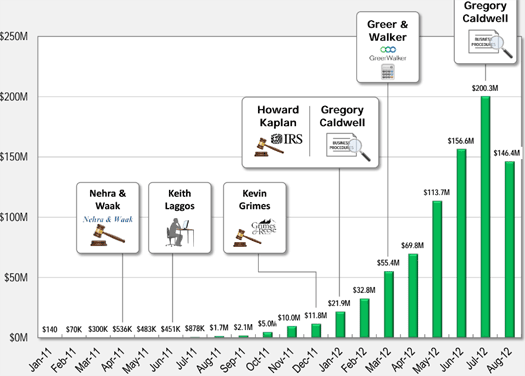DOJ objects to Paul Burks passing the buck onto experts
 Despite only informing the Department of Justice that he ‘may assert a reliance defense‘ and failing to name ‘specific individuals upon whose advice (he) relied (on)‘, Paul Burks’ attorneys presented slides during their opening statement that suggests he may attempt to pass the buck.
Despite only informing the Department of Justice that he ‘may assert a reliance defense‘ and failing to name ‘specific individuals upon whose advice (he) relied (on)‘, Paul Burks’ attorneys presented slides during their opening statement that suggests he may attempt to pass the buck.
Through a July 12th filing, the DOJ have pre-emptively objected to the possibility of Burks’ raising a reliance defense.
For those unfamiliar with the term, a reliance defense is the
genuine belief that one’s action is fully justified, both in law and in fact.
Under the good faith reliance on counsel, a person would not be willfully doing wrong, if before taking any action with regard to the alleged offense, s/he consulted in good faith a lawyer and disclosed all relevant facts to the lawyer and acted strictly in accordance with the advice given by the lawyer. (USLegal)
As per slides used in the defense’s opening statement, a number of parties are represented as having provided advice to Burks.

The more astute of you might have already realized the problem with Burks raising a reliance defense.
In raising a reliance defense, Burks would need to prove he acted on third-party advice prior to establishing Zeek Rewards.
Burks’ trial brief meanwhile
is based upon the assertion that he made changes to the (already existing and implemented) program in good faith based on the advice of experts.
That is, by his own admission Burks did not seek advice about potential future conduct, but instead about his ongoing conduct.
A reliance defense cannot be raised if one commits a crime and then seeks advice after the fact.
It is this crucial timeline of events that forms the basis for the DOJ’s objection.
Burks does not claim – nor can he – that any experts or attorneys were hired prior to the launch of ZeekRewards in January 2011.
Though cosmetic changes were later made to the program, it continued to
essentially function in the exact same manner as it had before any consultants or attorneys were employed.
The DOJ argue that
- any testimony from witnesses regarding “advice of counsel/expert” is irrelevant because he did not seek the advice until after he manifested the intent to commit the charged crimes and had taken significant steps in his scheme
- said testimony is also irrelevant unless Burks presents direct evidence of his reliance on a particular expert and
- said testimony should be precluded because it runs the danger of “confusing the issues and misleading the jury”
Point 2 is made under the current circumstances of Burks failing to provide any actual evidence that he relied upon a particular expert.
Point 3 is made because the testimony might suggest to the jury that
such advice might excuse past conduct and/or that such advice must have been relied upon by Burks simply because an attorney or expert told him, without any evidence of reliance.
It ties into point 2, in that Burks, to date, has not provided evidence he directly relied on the advice of an expert.
The DOJ sum up their motion by asking the court
to exclude testimony from Defendant’s “Advice of Counsel/Expert” Witnesses as irrelevant’.
In the alternative, the United States moves to exclude testimony from, Defendant’s “Advice of Counsel/Expert” Witnesses unless or until the evidence admitted at trial establishes that Defendant reasonably relied upon that particular witness with regard to future conduct.
Stay tuned…
Footnote: Our thanks to Don@ASDUpdates for providing a copy of the DOJ’s “Motion in Limine Regarding reliance witnesses” (filed June 12th).


the DOJ has charged burks with ‘mail/wire fraud’ and an important aspect of proving fraud is ‘intent’.
in its trial brief the DOJ wrote:
basically the DOJ is saying that burks intentionally ran a ponzi scheme and made cosmetic changes to ‘conceal’ its true nature and thus had fraudulent intent.
burks via a ‘reliance defense’ has stated in his trial brief:
basically, burks is saying that the fact that the changes suggested by professional experts were merely cosmetic and did not disguise the zeek program, shows that neither he or these experts knew that zeek was a ponzi or fraudulent scheme. hence his ‘intent’ was not fraudulent.
but burks reliance defense will fail, because he has to demonstrate that he provided these professional experts with ‘full and complete’ information and they advised him on the basis of all the information.
so, did burks give say, nehra and waak, the complete financials about the money in/out? did he give them info about how much profit was being generated from the penny auction? or how many retail bids were sold?
if burks cannot demonstrate he forwarded all this info to his experts, his reliance defense will fail.
I tend to suspect that Burks relied much more on Dawn and Daniel Olivares advice.
A hit man can be an expert and have years of experience in his field.
Pointing out that having these credentials might not represent something positive or legal. Perhaps they’re just experts at concealing, circumventing, and dealing.
Mob lawyer comes to mind.